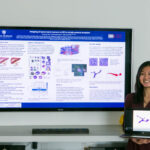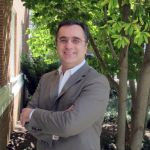Stavroula Sofou Awarded Grant to Develop a New Approach to Fighting Resistant Metastatic Cancer

Using a $125,000 grant from the W.W. Smith Charitable Trust, Stavroula Sofou, an associate professor of chemical and biomolecular engineering and a researcher with the Institute for NanoBioTechnology, is developing a new approach to fighting metastatic cancer resistant to other therapies.
Clinical studies using high-energy radiation in the form of alpha-particles against metastatic tumors have yielded some excellent results. However, the short range of these particles limits their ability to penetrate all areas of a tumor.
Sofou and her team propose to improve results through the design of nanocarriers that can deposit therapeutic alpha-particles directly to regions of the tumor unreached by the original therapy. The researchers posit that such uniform and prolonged radiation will inhibit tumor growth and metastatic spreading even in cases where tumors are resistant to other drugs and therapies, and regardless of the stage of the disease when treatment is administered.
“If successful, this strategy may introduce a new paradigm in alpha-particle radiotherapy to established tumors,” Sofou said.
The W.W. Smith Charitable Trust is a private foundation focusing on areas ranging from basic medical research to maritime heritage and education to supplementing higher-education scholarship programs.
Story original posted on the website for the Department of Chemical and Biomolecular Engineering.
Latest Posts
-
 Q&A with PSON Intern Jocelyn Hsu
August 19, 2021
Q&A with PSON Intern Jocelyn Hsu
August 19, 2021
-
 Start Up Founders from Johns Hopkins Aim to Stop Spread of Cancer
August 3, 2021
Start Up Founders from Johns Hopkins Aim to Stop Spread of Cancer
August 3, 2021
-
 Protein Appears to Prevent Tumor Cells from Spreading Via Blood Vessels
July 15, 2021
Protein Appears to Prevent Tumor Cells from Spreading Via Blood Vessels
July 15, 2021


